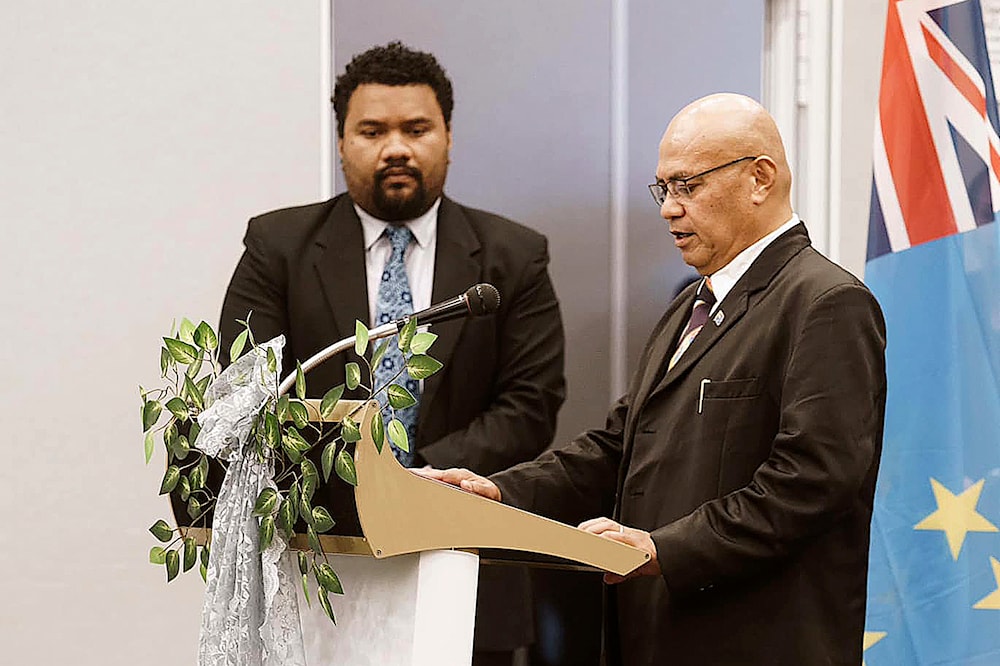Tuvalu PM asks Australia for 'guarantees' over sovereignty amid treaty
Teo speaks of fears among Tuvaluans that Australia “might encroach on Tuvalu’s sovereignty” due to a treaty signed last year.
-

In this photo provided by the Tuvalu government, the newly elected Prime Minister, Feleti Teo, right, is sworn into office during a ceremony in Funafuti, Tuvalu, Wednesday, Feb. 28, 2024. (AP)
The island of Tuvalu’s newly appointed Prime Minister, Feleti Teo, has requested “guarantees” from Australia that it won't undermine his country’s sovereignty in light of the controversial security clause in the Falepili Union treaty.
Teo told The Guardian of fears among Tuvaluans that Australia “might encroach on Tuvalu’s sovereignty” due to the treaty signed last year that the Pacific nation shall “mutually agree with Australia” on partnerships or arrangements with other states on security and defense-related matters.
However, this clause gives Australia veto power over Tuvalu entering into security agreements with other nations, which comes amid competition for influence in the Pacific.
"That obviously gives the impression of Tuvalu conceding its sovereignty to decide whatever security arrangement it prefers,” Teo said, expressing his disappointment at how quickly the previous government signed the agreement with Australia.
“What I’ve asked the Australians is that if we are able to come to some arrangement that stopped short of revising the treaty, that guarantees and assures that Tuvalu’s sovereignty is intact. Then I’m all good for it,” he continued.
Read more: Australia declares biggest navy plan since WWII
The treaty, signed between Australia's Prime Minister Anthony Albanese and Tuvalu’s former Prime Minister Kausea Natano also includes a special migration pathway for up to 280 Tuvalu citizens a year to live and work in Australia.
Under geopolitical tensions
Teo, a former attorney general who advised Tuvalu during the drafting of the deal, said that more time should have been allotted for public consultation on the matter, and because that didn't happen, Teo said the government will soon launch a campaign to explain the terms to the public.
“When the treaty was negotiated, there was no consultation with the public, so the people frowned on the treaty when it came out,” he said after confirming that he already discussed the concerns with Australian officials this week.
“That’s why we are mounting an educational program to socialize and explain to [the Tuvaluan public] the entirety of the treaty,” he added.
According to the PM, his government would “stop short” of changing any part of the deal, while seeking to address sovereignty concerns.
“If we will seek direct amendment of the treaty then it’s going to take a long time to be able to bring that into effect,” he stated, continuing, “If there is a way that stops short of revising the treaty that guarantees the integrity of the sovereignty of Tuvalu, then we will certainly explore those options.”
A Department of Foreign Affairs and Trade spokesperson in Australia claimed the treaty “recognizes that the statehood and sovereignty of Tuvalu will continue."
A policy fellow in Pacific affairs at the Australian National University and a former high commissioner to Tuvalu, James Batley, warned of a greater “impetus” for Australia to hold on to security assurances when negotiating with Pacific nations in light of the geopolitical tensions.
“Australia has made the point that decisions by Pacific island governments affect Australia’s national security,” Batley said. “What Australia gets out of this [Falepili treaty] is the reassurance that Tuvalu could not be used in a way that undermines our national interests, given the special status that we have granted Tuvalu through this treaty.”
'Flip-flopping' ties
Speaking of geopolitical tensions, Tuvalu is one of the few nations with formal diplomatic ties with Taiwan and not China.
Teo acknowledged the “flip-flopping” of other Pacific nations between Taiwan and China and asserted his government would refrain from doing that.
For instance, China and Nauru formally resumed diplomatic relations last month, after Nauru cut ties with Taiwan. Without Nauru, Taiwan only has 12 diplomatic allies left, including Paraguay, Belize, Guatemala, Haiti, Marshall Islands, Palau, St. Kitts and Nevis, St. Lucia, St. Vincent and the Grenadines, Eswatini, Tuvalu and Vatican City.
“I have far more immediate pressing development challenges,” he said, as he listed other priorities like the need to improve medical and educational services to Tuvalu’s remote islands. “Those are more pressing in my own calculations than wasting efforts on engaging on the China discourse.”
The climate crisis was another highlighted priority. Tuvalu, alongside other Pacific nations, is urging for a global fossil fuel non-proliferation treaty that encourages phasing out of oil, gas, and coal production.
When he was asked if Tuvalu’s new government would request Australia to stop new fossil fuel projects, Teo expressed being “heartened” by Albanese’s climate commitments during their last phone call.
“It was my first conversation with the prime minister of Australia so I took it on face value that the Australian government is committed to reducing their level of emissions,” he said. “I’ll just take that and observe their actions and hopefully that will match their commitment.”

 5 Min Read
5 Min Read








